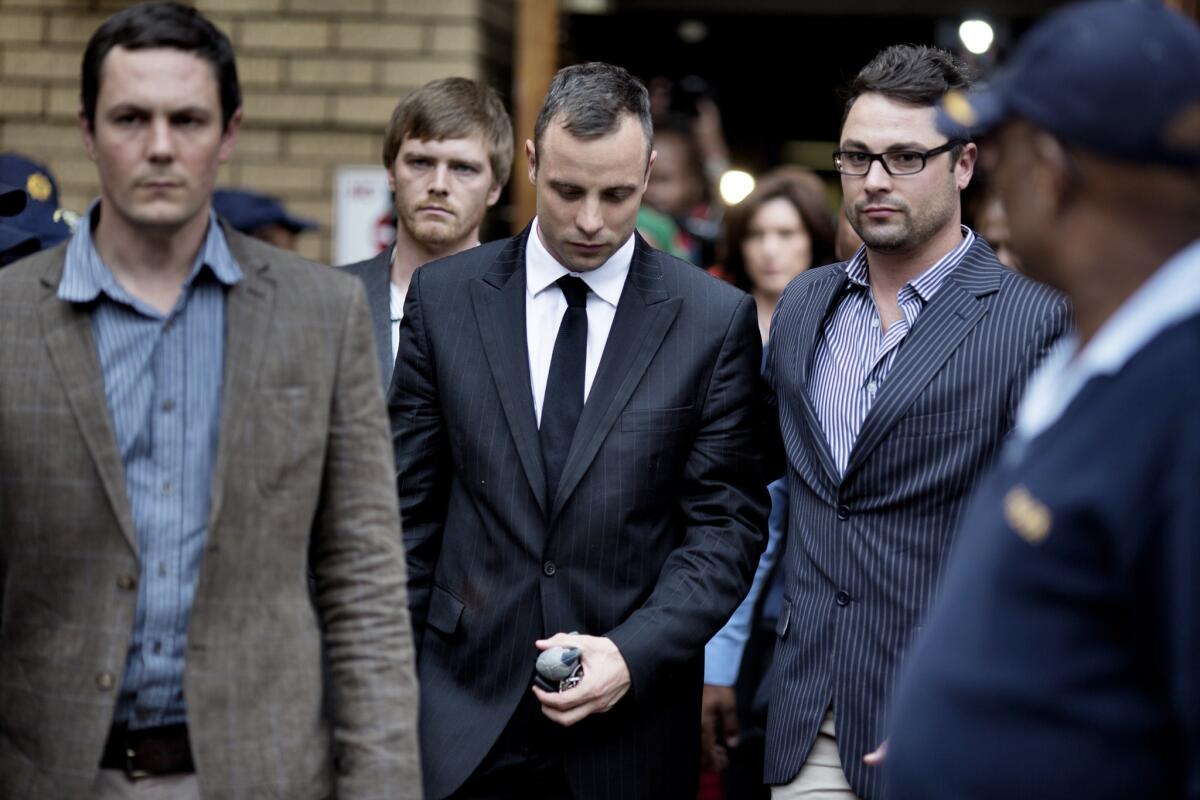Op-Ed: Pistorius, Zuma: Is this really the best South Africa can do?

- Share via
In South Africa today, as the country celebrates the 20th anniversary of its democracy and prepares for elections, two deeply flawed folk heroes — one venal, the other violent — have commandeered the headlines. The president, Jacob Zuma, was recently found by the Public Protector, an independent constitutional body, to have misappropriated $20 million to upgrade his private home. And Oscar Pistorius, a double amputee who awed the world with his speed running on prosthetic legs, is being tried for murder in the killing of his girlfriend.
With Nelson Mandela dead and his African National Congress increasingly troubled, Pistorius and Zuma have, distressingly, become the poster boys for South Africa’s 20 Years of Freedom celebrations.
We South Africans love an underdog, perhaps because of our history, and both Zuma and Pistorius have milked that role. From an Afrikaner Calvinist tradition, Pistorius offers a story of triumph over adversity through God-fearing hard work. Then Zuma, from a poor rural Zulu and working-class township background, presents a narrative of the cunning trickster with little formal education who always finds himself on his feet and takes what he needs with a nudge and a wink.
Both men have been breathtaking in their perseverance and achievement. Zuma stopped a bloody civil war in his home province of KwaZulu-Natal. And, as an undereducated peasant who has risen to the very top, he stands as a symbol to black South Africans that they can be masters of their own destiny. Similarly, Pistorius transforms our understanding of what “able-bodied” means, even in the way he strides up to the dock.
But both men also seem to have fallen victim to the underdog’s sense of moral exceptionalism: They are right while everybody else is wrong. In this closed circle, so brutally exposed during the cross-examination of Pistorius in court this month, any criticism just reaffirms to them that they are underdogs and that they thus have to fight harder — and perhaps dirtier — to survive.
Something has happened, though, these last few weeks, first with the release of the Public Protector’s report on Zuma, and now with the Pistorius trial. As the public dramas have played out, both men have forfeited their victim status, and we may never be able to understand them as underdogs again.
If everyday chatter and call-ins to the radio talk shows are anything to go by, there is not much sympathy left for Pistorius in South Africa. This is, in part, because he stands accused of trying to justify the killing of his girlfriend Reeva Steenkamp by abusing a legitimate fear with which all South Africans live: the fear of criminal violence and home invasion.
Public opinion about Zuma is more difficult to gauge. He was booed at Mandela’s memorial service in December, and several senior comrades have left the ANC because of him. There are no published polls measuring his popularity against that of the ANC, but many of the party’s leaders admit privately that an increasing number of their constituents will be voting for the party in spite of, rather than because of, its president. Still, the ANC will trounce the opposition once more in national elections scheduled for May 7 (just two days after the Pistorius trial resumes in Pretoria).
There are many reasons for this loyalty to the ANC, ranging from an atavistic adherence to the liberation movement to the fact that most South Africans’ lives have improved since the end of apartheid. Whether at the upper end, through affirmative action tenders, or at the lower end, through state pensions and child grants, millions of South Africans are dependent on the ANC government. Few are willing to bite the hand that feeds them.
There has also not been, until now, a credible black-led opposition. That is changing, and it will be interesting to watch on May 7 how well the demagogic populist Julius Malema’s Economic Freedom Fighters fare. Expelled from the ANC, Malema is a classic underdog in the Zuma vein: Undereducated and weaned in the struggle, he lives by his wits and has appetites that supersede his means. He will draw support away from his former mentor, at least in part because some voters need a new underdog to back now that Zuma has shed this skin.
Meanwhile, the Pistorius trial courses through the electoral season like a foul river, carrying the country’s legacies of fear and violence on its currents. These legacies include an unspeakably high level of violent crime — and a contempt for the law and a culture of impunity that spools down from the top, exemplified as much by Zuma’s home improvements as by Pistorius’ guns.
And yet here she is, firm but empathetic, presiding over the Pistorius trial: Judge Thokozile Masipa. And here too is South Africa’s Public Protector: Thuli Madonsela, who had the courage to stand up against the president and his bullying henchmen. The fact that these two black women have constitutionally vested power in South Africa today — the one a highly competent judge, the other a fearless anti-corruption crusader — says much about how far the country has come in the two decades since I voted for the first time, for Nelson Mandela.
These are the real poster girls for the South African democracy.
Justice will be done.
Mark Gevisser’s new book is “Lost and Found in Johannesburg: A Memoir.”
More to Read
A cure for the common opinion
Get thought-provoking perspectives with our weekly newsletter.
You may occasionally receive promotional content from the Los Angeles Times.









